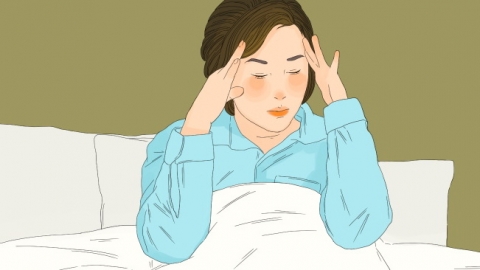How is sleep apnea syndrome treated?
Generally, sleep apnea syndrome usually refers to obstructive sleep apnea hypopnea syndrome. Obstructive sleep apnea hypopnea syndrome may be caused by obesity, improper sleeping posture, rhinitis, adenoid hypertrophy, poliomyelitis, and other factors. General treatments and medications may help alleviate the condition. Prompt medical consultation and following the doctor's instructions are necessary. Details are as follows:

1. Obesity: Obesity leads to increased fat accumulation in the neck area. This fatty tissue compresses the airway, causing it to narrow. During sleep, muscle relaxation further exacerbates this narrowing, making breathing difficult and increasing the likelihood of breathing pauses. Weight loss through dietary control and increased physical activity can reduce the pressure on the airway.
2. Improper sleeping posture: Sleeping in the supine position causes the base of the tongue to fall backward due to gravity and positional effects, leading to collapse and obstruction of the upper airway, which may trigger apnea. It is recommended to sleep on one's side, which helps prevent the backward displacement of the tongue base and reduces the risk of upper airway collapse.
3. Rhinitis: Rhinitis causes nasal mucosal congestion, swelling, and increased secretions, which increase nasal resistance and impair smooth breathing. During sleep, muscle relaxation makes the already narrow nasal passages more prone to collapse, triggering apnea and causing headaches. Follow the doctor's instructions to use medications such as Xuanfei Tongqiao Granules, Qianbo Rhinitis Tablets, and Tongqiao Rhinitis Granules to relieve nasal congestion and improve breathing.
4. Adenoid hypertrophy: Adenoids are lymphatic tissues located at the top of the nasopharynx and have immune functions. When adenoids are stimulated by inflammation, they may proliferate and enlarge, blocking the upper airway, causing apnea and runny nose. Under a doctor's guidance, use medications such as Amoxicillin Capsules, Erythromycin Enteric-coated Tablets, and Azithromycin Tablets to treat infection and reduce bacterial activity.
5. Poliomyelitis: Poliomyelitis affects the function of throat muscles, causing muscle weakness and relaxation. During sleep, the combined effects of muscle relaxation and gravity make the throat more prone to collapse and obstruction, leading to apnea and muscle atrophy. Follow the doctor's instructions to use antiviral and anti-inflammatory medications such as Ribavirin Tablets, Acyclovir Tablets, and Cefradine Capsules.
In daily life, attention should be paid to improving lifestyle habits, such as losing weight, avoiding improper sleeping positions, quitting smoking, and limiting alcohol consumption, to alleviate symptoms and prevent further progression of the condition.









